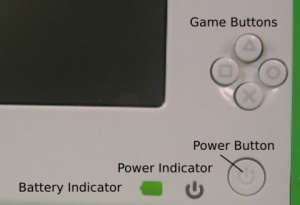OLPC Firmware q2c18
OLPC Firmware Release q2c18 - 2007-06-14
This firmware is the version that was factory-installed on the BTest-4 built. It will also work on all board s except pre-B1. Do not use it on pre-B1 boards - it will brick them because of the EC microcode.
BIG FAT WARNING!
The manufacturing data has moved locations. If you are upgrading from the B series of the firmware the manufacturing data will be moved to its new location. After that has happened you must not install anything from the B series of the firmware. If you do then you will erase your manufacturing data.
Download: q2c18
How to get the ok prompt
Press the "X" (down) game key after hitting the power button to enable the ok prompt. You still have to press the ESC key (upper left on the keyboard ![]() ) during the countdown. If you don't press the "X" game key, the firmware goes into fastboot mode, in which:
) during the countdown. If you don't press the "X" game key, the firmware goes into fastboot mode, in which:
- The keyboard is not probed, thus saving some time
- The boot order is SD, USB, NAND, wireless
- OFW does not put any text on the screen, just graphics
In some previous firmware versions, pressing any game key would get you to interactive mode; in this version, only the "X" game key, which is the one nearest to the power button, does so.
How to play the startup sound
The startup sound was annoying developers, who reboot frequently, so it is no longer automatic. To play it, after you press the power button, press the small button that is on the other side of the display, across from the power button.
Changes since OLPC Firmware q2c17
Open Firmware is r444M
- Reinstate USB probing in fastboot mode, thus making USB available as a boot source (change requested by manufacturing).
EC code is PQ2C17
No changes from q2c17
Installation Instructions
- If you have a B1 or B2 system:
- Detailed upgrade instructions are located here.
- If your firmware version is earlier than the version in Auto Install Image then you can just use that procedure for the update.
Note: that this procedure will also upgrade the image in your nand flash -- which is the entire Linux operating system and all the files you may have edited or saved. This means it will ERASE what is in your nand and re-write it. So you will lose any data you have stored on the filesystem unless you back it up. If you do not want your files erased, then please use the first procedure above. - Do NOT use olpcflash to write new firmware images. Doing so will erase the manufacturing data that was added at the factory.
- After you reflash, you must power cycle by physically removing power from the system. A warm-start or button-induced restart is not sufficient. Please remove both the battery pack and wall adapter for 10 seconds.
- If you have an ATest system
- If you use olpcflash to write this image, you must use the --brick option.
Example:olpcflash --brick -w image.rom
The --brick option makes olpcflash update your EC code as well as the firmware.
- If you use olpcflash to write this image, you must use the --brick option.
